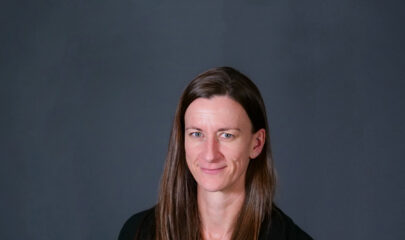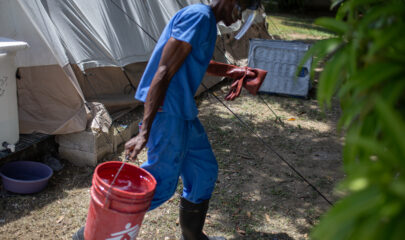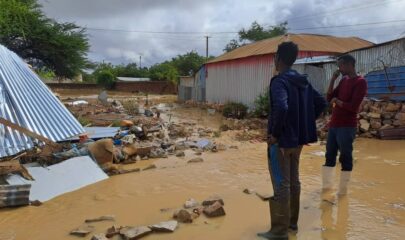FEWER RESOURCES, HIGHER NEEDS AND NEW CHALLENGES

I hope you and your loved ones have fared well through these extraordinary months.
Doctors Without Border/Médecins Sans Frontières (MSF) is no stranger to difficult circumstances, but COVID-19 has challenged and stretched us in ways we have not seen before.
Restrictions make it harder to get medicines and staff where they need to be. Shortages and inequitable global distribution of protective gear, such as masks and gloves, make it harder to keep our staff safe. The pandemic also makes activities like measles vaccination and mobile clinics less possible. And it has indirect impacts too, such as diverting the already limited resources of weaker healthcare systems, and exacerbating sexual and gender-based violence as we have seen in some of our programs.
But our teams have stepped up. With travel restrictions, we have ramped up telemedical support to medics and online trainings for field staff. The pressures are immense, but we have kept nearly all medical activities running while preparing for or responding to COVID-19 in most projects.
Yemen is one of the more severely hit areas so far. Of 279 COVID-19 admissions to the MSF-supported hospital in Aden in May, 143 have died. This shocking death rate indicates only the worst-off are braving the voyage to seek medical care. How much worse will it get in Yemen and in places like Amazonas state in Brazil, Haiti, Nigeria or the Rohingya refugee camps in Bangladesh?
MSF has also felt compelled to assist the pandemic response in places where we do not normally act, like South Korea, Norway, Belgium and even here in Canada. MSF has been responding to outbreaks such as cholera, measles and Ebola for nearly 50 years. We have knowledge to share, even where health systems are robust. In Canada we became operational, albeit modestly, for the first time, advising front-line responders assisting at-risk groups including people experiencing homelessness, residents of long-term care facilities and indigenous communities.
Facing the likelihood of further waves of the virus, the only real way out is through a vaccine that does not yet exist. The global effort to find one – including through $1b in Canadian public funding – is unprecedented, but the looming question is: once developed, who will have access to it? MSF is strongly advocating for new COVID-19 diagnostics, drugs and vaccines to be considered public goods, affordable and available, and not for profit.
MSF continues to maintain our medical care for tuberculosis and malaria patients, people wounded in war, pregnant women, people displaced from their homes, malnourished children and many more in over 450 projects around the world. Thank you for being a part of it.
Your gifts help MSF save lives. In 2019, more than 96 per cent of our funding came from private donors like you— rather than from governments or large institutions— giving us the independence to respond to emergencies quickly and to go where we are needed most. Now, as COVID-19 continues its rapid global spread, we need your help more than ever. Please donate now to MSF’s COVID-19 Crisis Fund to help us respond to the ongoing pandemic and its consequences on our regular programs. We are grateful for your support.
MEDICAL CARE IN ACTION
Democratic Republic of Congo:
The Ministry of Health in Democratic Republic of Congo (DRC) has declared the eleventh Ebola virus outbreak in the country since records began. MSF immediately sent an exploratory team to Mbandaka to identify ways to offer support and medical care. Any MSF intervention is decided based on information collected during the initial fact-finding work, and MSF’s operational capacities in relation to our other ongoing activities in DRC. Response mechanisms to Ebola are still in place in the east of the country, where MSF has trained medical teams and strengthened prevention and treatment measures in support of the public health system.
Ukraine:
Three years ago, MSF designed a model of cooperation with the Ministry of Health in Mykolaiv, Ukraine, to use generic drugs to treat hepatitis C. It was the first time generic drugs for hepatitis C were used in the country. MSF provided not only medications but also tests, laboratory equipment and supplies. Ambitious goals were achieved, and MSF has handed over the project to local health authorities. Medications were provided to treat more than 1,300 patients, of which around 1,150 have now completed treatment. More than 7,200 health education and counselling sessions were conducted by former patients hired and trained by MSF.
EDITORIAL NOTE. Since the pandemic was first declared on March 11, 2020, the world has grappled with suffering and loss of life at the same time and attempted to keep up with the rapidly changing effects of COVID-19. In this edition of Dispatches, we try to place the healthcare needs of our patients and other vulnerable people affected by the pandemic in the context of what can feel like an overwhelming story. Our teams continue to deliver lifesaving care and be present in solidarity with vulnerable people affected by COVID-19 and other ongoing health crises.


